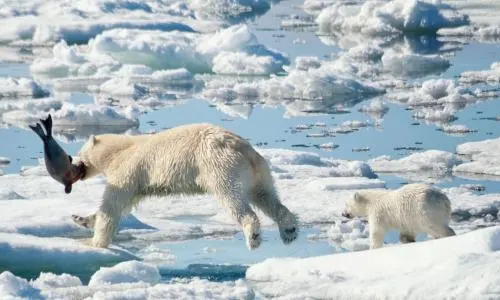Amid rapidly rising scientific concern over the world’s melting ice caps and glaciers, French president Emmanuel Macron has announced that the country will spend over €1bn (£880m) on polar research between now and 2030.
A new polar science vessel will spearhead the effort, and France is calling for a moratorium on the exploitation of the seabed in polar regions, to which the UK, Canada, Brazil and 19 other countries have so far signed up, Macron told a summit of heads of state and scientists in Paris.
“We are not talking about a threat for tomorrow, but one that is already present and accelerating,”Macron said. “We are talking about a transformation of the cryosphere [the Earth’s ice] that already threatens millions and will threaten billions of the planet’s inhabitants with multiple direct and indirect consequences.”
The plight of the Earth’s polar regions and glaciers has sparked alarm among many scientists, as heatwaves at both poles, which were seen for the first time last year, look set to be a regular occurrence. Already, this year has been proven to be the hottest on record and probably the hottest in 100,000 years, with ocean temperatures so far above normal as to be, in the words of one scientist, “gobsmackingly bananas”.
Read also: WHO unveils framework for climate resilient, low carbon health systems
The Earth’s ice caps reflect much of the sun’s light back into space, known as the “albedo effect”, and the melting ice leaves dark sea that absorbs more heat, making the disappearing ice a potential tipping point for the climate that would cause a rapid increase in heating.
Although John Kerry, the US special presidential envoy for climate, did not attend the Paris summit, he sent a video message in which he warned of the consequences.
“We must understand the tipping points, the points which there is no reclaiming, there is no coming back,” he was quoted as saying.
Now, some scientists have come to terms with the fact that only drastic measures can avoid the worst. Among them is Sir David King, former UK chief scientist, and now head of the Centre for Climate Repair at Cambridge University, who is researching ways to refreeze the Arctic ocean.
Macron called the high-level meeting of heads of state from countries with polar territory or that have glaciers, accompanied by leading scientists, in Paris on Friday.
Story was adapted from the Guardian.
